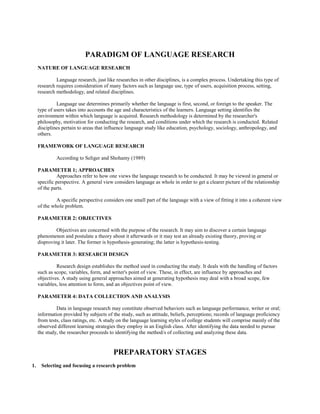
Language Research Paradigm Guide
- 1. PARADIGM OF LANGUAGE RESEARCH NATURE OF LANGUAGE RESEARCH Language research, just like researches in other disciplines, is a complex process. Undertaking this type of research requires consideration of many factors such as language use, type of users, acquisition process, setting, research methodology, and related disciplines. Language use determines primarily whether the language is first, second, or foreign to the speaker. The type of users takes into accounts the age and characteristics of the learners. Language setting identifies the environment within which language is acquired. Research methodology is determined by the researcher's philosophy, motivation for conducting the research, and conditions under which the research is conducted. Related disciplines pertain to areas that influence language study like education, psychology, sociology, anthropology, and others. FRAMEWORK OF LANGUAGE RESEARCH According to Seliger and Shohamy (1989) PARAMETER 1; APPROACHES Approaches refer to how one views the language research to be conducted. It may be viewed in general or specific perspective. A general view considers language as whole in order to get a clearer picture of the relationship of the parts. A specific perspective considers one small part of the language with a view of fitting it into a coherent view of the whole problem. PARAMETER 2: OBJECTIVES Objectives are concerned with the purpose of the research. It may aim to discover a certain language phenomenon and postulate a theory about it afterwards or it may test an already existing theory, proving or disproving it later. The former is hypothesis-generating; the latter is hypothesis-testing. PARAMETER 3: RESEARCH DESIGN Research design establishes the method used in conducting the study. It deals with the handling of factors such as scope, variables, form, and writer's point of view. These, in effect, are influence by approaches and objectives. A study using general approaches aimed at generating hypothesis may deal with a broad scope, few variables, less attention to form, and an objectives point of view. PARAMETER 4: DATA COLLECTION AND ANALYSIS Data in language research may constitute observed behaviors such as language performance, writer or oral; information provided by subjects of the study, such as attitude, beliefs, perceptions; records of language proficiency from tests, class ratings, etc. A study on the language learning styles of college students will comprise mainly of the observed different learning strategies they employ in an English class. After identifying the data needed to pursue the study, the researcher proceeds to identifying the method/s of collecting and analyzing these data. PREPARATORY STAGES 1. Selecting and focusing a research problem
- 2. a. Sources of a research problem. A research topic may be derived from 3 sources: the researcher's experience and interest, other language researches; researches on allied disciplines. 1. Researcher's experience and interest. A research problem may come from the researcher's personal experience with the study of language which he/she finds interesting. In school or at work as a student or a teacher, he/she may observe things happening in the process of learning or teaching which arouse curiosity and lead to questions seeking answers. The desire to find answers to such questions may trigger the development of a research problem. 2. Other language researches. Most studies recommend a list of other research topics. From this list, a researcher may get ideas on interesting topics to work on. 3. Researches on allied disciplines. Language study is closely linked with other disciplines as mentioned earlier. Reading researches in Psychology, Education, Sociology, Anthropology can provide the researcher a rich source of topics from which a research problem may be chosen. b. Focusing a research problem. After selecting a general topic, the next task to consider is how to narrow down the topic into something that can be done within the limits of the researcher's environment such as time, resources, researcher's expertise, and other conditions under which the study would be conducted. c. Formulating the general and specific questions. Having decided to work on a specific aspect of the topic, the researcher now has to translate this choice into general and specific questions which will constitute the research statement of the problem. One general problem that expresses the entire goal of the study will be formulated followed by three to five specific questions inquiring on the particulars of the general problem. 2. Deciding on the research methodology a. Choosing the appropriate methodology and procedure. Decisions on the appropriate method of research to use depend on the research approach and objectives used in the study. There are many methodologies used in language research, but the common ones are descriptive, and experimental. 3. Reviewing related literature and studies a. Reason for the review. A review of related literature and studies is necessary for two primary reasons: 1. To broaden the researcher's perspective of the research problem and 2. to help him/her focus the problem into a workable research question. b. Sources of related literature and studies 1. Libraries. School and other institution libraries are the primary provider of information for the review. However, many libraries are inadequate in providing the materials that the students need. 2. On-line. Today, much information is provided by the internet which has boosted research. The researcher must however, judicious in selecting materials because not all information posted on-line is reliable. 3. Professional organizations. Some valuable materials on their specific disciplines are kept by professional organizations. Attending their conferences will provide access to these materials. 4. Foreign embassies. Some researches especially in social sciences will find valuable materials in embassies. A letter requesting access to these materials endorsed by the student’s adviser and dean can help facilitate research in these libraries.
